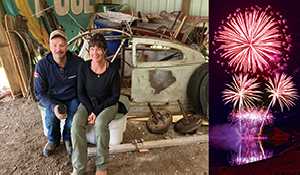Moe, Higgs see national support for energy corridors
February 27, 2019, 3:20 am
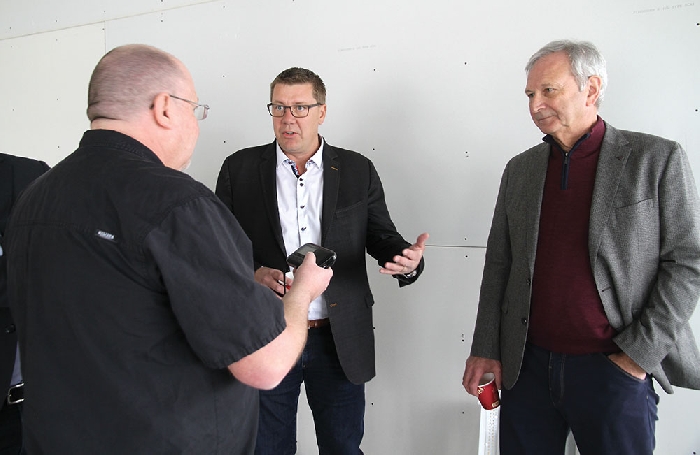

World-Spectator editor Kevin Weedmark interviewed Saskatchewan Premier Scott Moe and New Brunswick Premier Blaine Higgs about the energy industry when they were in Moosomin for the Pro-Resource Rally on Saturday, February 16.
For both of you, why did you decide this is important enough an issue for you to come out to Moosomin today?
Scott Moe: From Saskatchewan’s perspective, the energy industry is one of the most important wealth-generating industries that we have. There are people employed across this province, and across the nation as a result of the strong, sustainable energy industry we have in Saskatchewan. I’m just absolutely pleased to welcome the premier of New Brunswick here today as New Brunswick represents the other end of the energy industry if you will—the other end of the pipeline. I’m here advocating on behalf of our wealth-generating sustainable energy industry as well as advocating toward being able to transport this sustainable product toward other areas of Canada and ultimately to displace barrels of oil that are coming into our nation from other areas of the world, and ultimately to displace barrels of oil with sustainable Western Canadian product all around the world.
And Premier Higgs, why did you decide this was important enough to come half way across the country?
Blaine Higgs: Well, for me, this is a “building Canada” moment. In New Brunswick, we are home to the largest refinery in North America—about 350,000 barrels a day, and out of that it would on average have 200,000 or 250,000 barrels of foreign crude. That’s unacceptable when crude is stranded in one part of the country and can’t get to a refinery in the other part. In addition to that, the operation of the terminal there, bringing in the largest tankers in the world, unloading—we should be loading. I was in that industry for over 30 years, I know how it works, I know the opportunity, and it’s just a shame that we can’t connect the dots, we can’t have a project in the national interest that gets us from one province to another.
In working with Premier Moe, it’s been really exciting for me. We’ve had some great conversations, he’s been a great coach and mentor for me, coming into politics in this role. Thinking about how we can rebuild Canada, one province at a time, to get alignment, that’s our goal. We have some bumps to cross in Quebec but we will work through that.
What do you think can be accomplished if the provinces can work together on this issue?
Blaine Higgs: I think the end result is we will have an energy corridor running from coast to coast. Our goal right now is to make that happen. It’s vital for the future of our country.
Scott Moe: I agree with that. Getting our energy products to market, whatever they may be, whether its hydropower, whether it’s the sustainable energy product we have here in Western Canada, we need to work together as premiers across this great nation so we are able to generate jobs, and ultimately wealth, in communities in Western Canada like Moosomin, but also in communities in New Brunswick, creating jobs at the refining end of the pipeline, and we shouldn’t forget about the jobs and wealth that are being created all along the way. That is important. Our nation is stronger when our provinces are stronger, and this nation building opportunity to work together towards the ultimate goal of an east-west energy corridor across our nation is an important piece of our nation’s future, and it’s something I think we have a role to play in as provincial premiers.
What needs to change to make a project like Energy East possible again. Is it simply a matter of rescinding Bill C-69 if it passes, or is there more to it than that?
Scott Moe: At the higher level, the energy sector, the entire energy sector and the wealth of our communities need the support of the federal government. That’s what you’re going to see the message will be here today. At the very highest levels, what we need to see is the support of our federal government for our energy sector, from the pumpjacks that we see out here on the Prairies right through to the barrel of oil leaving the refinery in New Brunswick.
Blaine Higgs: And I would say in addition to that, events like this, that show the public are not prepared to just let our resources be devalued, which affects jobs and families. New Brunswick has been a recipient of transfer payments for a long time. I’m not a fan of that fact, but equally I recognize the importance of a united country, which makes it possible. So ultimately it’s unacceptable to see stranded assets that are devalued.
Having people speak up is going to be huge. I have said many times I feel like a stranded asset in New Brunswick, because of the difficulty getting through Quebec. If we can work together as provinces and the federal government can realize that we’re just not going to stand around and let our commodities be devalued, things can change.
And Bill C-69, it should not pass. In the condition it is now, it should not go forward.
Moosomin is a community that’s very familiar with pipelines. We have Enbridge just to the south, TransCanada just to the north. What does it say to you that a community that is so familiar with pipelines is organizing an event like this to show their support?
Scott Moe: I think Moosomin is a microcosm of the Saskatchewan economy and maybe even the Western Canadian economy. We have manufacturing in this community, we have a vibrant agricultural industry in this community, we have an energy industry and a transportation of that energy industry in this community, as well as the potash mines right here in the area, so it really is indicative of the Saskatchewan economy, and I think there is no better place to have a gathering of people that are speaking out against some of the headwinds we’re facing in Bill C-69, against the headwinds we’re facing in all of these industries with the imposition of a federal carbon tax. This is precisely the message that needs to be sent to the federal government and it is my hope that it will be heard by the federal government and they will come out and support the wealth generating industries that benefit Canadians right across this country.
There has been an increase in oil by rail because of the lack of pipeline capacity, and just this morning there was a derailment at St. Lazare, 37 cars carrying crude oil. What do you think that says about the pipeline versus oil by rail argument?
Scott Moe: First of all I would say the oil is on the rails because of a lack of pipeline capacity. It’s not good when we have what happened this morning in St. Lazare, and we offer Saskatchewan’s support in anything that’s needed to ensure that cleanup goes as quickly as possible and there’s as little damage as possible. But the fact of the matter is it speaks to the larger challenge that we have of not only the direct economic impact to the industry of having that energy product in a pipe, but the safety of having that energy product in a pipe as well.
The indirect economic impact for our province and for Canada as a whole is we need that rail capacity for other industries as we move forward, and I mentioned the other industries that are important in the community of Moosomin. Some of them are also important to other industries in Western Canada—the agriculture industry, the fertilizer industry, the potash industry for example—and we need that rail capacity for those other industries that continue to grow in capacity and volume.
If it can go in a pipe, and that’s the safest way to transport that product, and the most efficient way, and the most sustainable way from a carbon perspective, that’s where that product should be, and that’s why we should not only be looking at proceeding with Energy East, with the full support of the federal government, but the TransMountain Pipeline should be moving forward sooner rather than later, and we should reopen conversations around Northern Gateway and MacKenzie Valley and all of these opportunities to get our sustainable products in this nation to other Canadians and other people in the world.
Blaine Higgs: And that’s the irony of it all. There’s no debate the pipelines are the safest mode of transportation. When you have that as a starting point, and you have the support at either end, not only the lifestyle that’s here, and supported by the oil and gas industry, but at the other end at the refinery. We were permitted to build a second refinery at one point. We’re permitted for expansion. We’re permitted for expansion of the tank farm. There’s no problem, there are no issues, people want to see the jobs and the growth. When you have solutions for either end of the country, you figure out we can work through this. When you have the reality of the safety of oil transportation, and you have the displacement of foreign crude being brought in, all of those factors build to one solution.
Let’s make it happen. Let’s stop talking about it—let’s make it happen.
Scott Moe: We have the opportunity to join, ultimately to advocate, and we’ll see how far this goes with respect to some of these nation-building energy corridor projects. You’re going to see a lot advocacy over the next number of weeks and months, with respect to a number of premiers on these types of energy corridor projects that have the ability to add value and jobs to communities right across this nation. This is no longer a Western Canadian premier or Western Canadian premiers speaking out for the energy industry, this is Canadians right across the nation speaking out for the jobs and the wealth this industry can provide for communities right across Canada.
So what are both of you hoping will be accomplished by this event today, what message do you hope gets out from this?
Scott Moe: For me, I hope it is a continued beginning to a broader conversation about just that, how we can utilize sustainable, affordable, high quality Canadian energy, work together as provinces across this nation to ensure we can maximize the value of that energy for all Canadians, but also purchase our own energy, if you will, and do right by the environment, do right by our economy, and do right by the people that we represent in this nation.
Blaine Higgs: And for me it’s showing that there’s a common goal across the country, and working with premiers like Premier Moe and others we’ve been talking to through this process, that we are connected east to west, and we respect the fact that it’s important to our nation to be strong in that regard, and its’s important to meet the challenges that each of us have in order for us to survive and succeed. And that’s why for me, to be home and thinking ‘well, it’s not my problem’—well it is our problem and in order to get it fixed, we have to stand up and be counted as part of the solution.

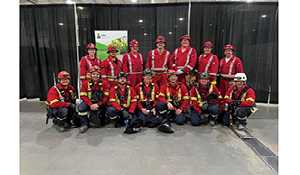





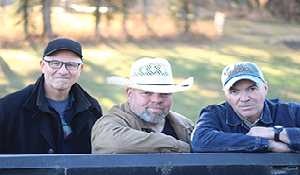
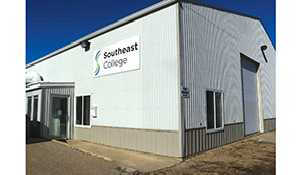
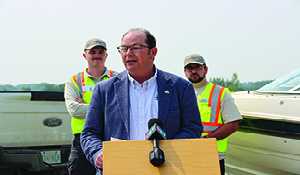
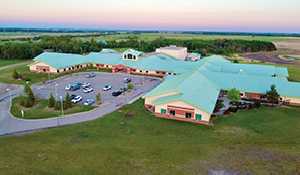

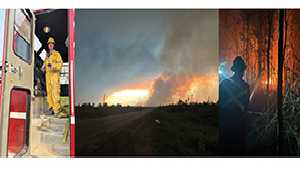










SM.jpg)








